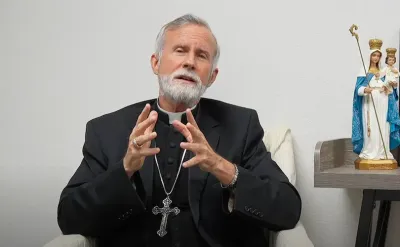Successive waves of migration have been orchestrated by the Belarusian and Russian authorities to open a new channel of mass migration from the Middle East and Africa into the European Union.
(Ordo Iuris) — The pressure on the European Union’s southern borders has continued unabated since the great migration crisis of 2015.
- Since 2021, the Polish and Lithuanian borders with Belarus – also part of the EU’s external border – have been subjected to unprecedented migration pressure.
- Modern international law does not offer easy tools for addressing this new threat.
- Only a firm border protection policy can effectively close migration channels.
- The so-called “migration pact” adopted by the European Union under these circumstances does not solve these problems through effective border protection.
- Instead, it reflects a determination to create rapid, smooth migration processes, grounded in a belief in the inevitability of mass migration and its positive impact on European society, economy, and culture.
- The migration pact may discourage member states from effectively combating illegal immigration, as they may be compelled by a qualified majority in the Council of the EU to accept a designated share of illegal immigrants arriving in other countries.
- The purpose of this report is to familiarize readers with the regulations collectively known as the “migration pact” and to link them to specific, likely consequences.
Read the report HERE.
The pressure on the European Union’s southern borders has continued unabated since the great migration crisis of 2015. Since 2021, the Polish and Lithuanian borders with Belarus – also part of the EU’s external border – have faced unprecedented migration pressure as part of the so-called “hybrid war” waged by Belarus and Russia.
Successive waves of migration have been orchestrated by the Belarusian and Russian authorities to open a new channel of mass migration from the Middle East and Africa into the European Union. This “weapon of mass migration” is a phenomenon that has been named and described in international law for over a dozen years. It is characterized by the abuse of international treaty obligations on refugee protection in order to destabilize targeted countries.
Migration as a weapon has also long been used by Islamist organizations, including the Muslim Brotherhood, to conquer (Islamize) Europe, as well as hostile states and terrorist organizations – as demonstrated by the Islamic State and other groups sending jihadists to Europe under the guise of asylum seekers.
Modern international law offers limited tools to counter this emerging threat. Any defensive measures risk harming genuine refugees. Nevertheless, only a firm border protection policy can effectively close migration routes and save thousands of migrants from being exploited – whether by hostile governments, terrorist organizations, or human-smuggling mafias profiting from their vulnerability.
READ: Poland discovers election interference by globalist group with apparent ties to US Democrat Party
The so-called migration pact, adopted by the European Union under these circumstances, fails to solve these problems through effective border control. Instead, it expresses the EU’s commitment to creating streamlined migration procedures based on a belief in the inevitability of mass migration and its beneficial effects on European society, the economy, and culture. Consequently, the pact’s implementation will likely facilitate the legalization of migration and ensure a more even distribution of the burden of receiving millions of illegal migrants among member states via a solidarity mechanism.
For this reason, the EU’s migration pact may discourage member states from effectively combating illegal immigration. They may be forced, by a qualified majority in the Council of the EU, to accept a mandatory quota of illegal immigrants arriving in other countries.
The purpose of this report is to introduce readers to the body of regulations collectively referred to as the “migration pact” and to highlight their likely consequences.
Ultimately, this report is also a call to support efforts by European Union governments affected by the migration crisis to modernize the international refugee protection system. Such reforms would ensure that treaty obligations cannot be exploited to destabilize states. A systemic change would not only safeguard the interests of countries vulnerable to migration-based aggression but would also clearly define the conditions under which refugee guarantees may be suspended in emergency situations.
Reprinted with permission from Ordo Iuris.

